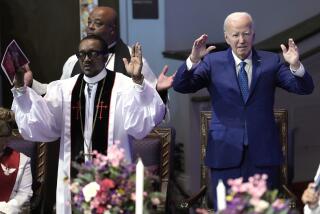Radio Show on Verdicts Gauges Pulse of the Public : King case: People from around the country and the city talk mostly about economic and racial issues.
- Share via
Calls from across the nation poured in Monday to First African Methodist Episcopal Church, where National Public Radio’s “Talk of the Nation” tapped what people were thinking two days after verdicts in the Rodney G. King civil rights case.
While the hodgepodge of questions to the national call-in show--which will air from the church through Thursday--was varied, racial issues and economics were at the crux of the responses.
Christopher Brown, a former Crip who is trying to start his own clothing-manufacturing business, said he has encountered difficulty finding money.
Brown said he has had “enough shucking and jiving and paper pushing. What I need is some dollars.” He argued that he and others deserve government assistance, which he contended has not come to many deserving people in inner-city Los Angeles.
He was one of about 18 people in the program’s live audience at First AME Church. Rep. Maxine Waters (D-Los Angeles) and Secretary of Commerce Ron Brown, who called in from Washington, were among those who participated in the two-hour call-in show.
The most heated point of the show came when a caller from Brooklyn, N.Y., insinuated that minorities are looking for handouts and using the threat of an uprising in Los Angeles to get what they want.
Waters, after telling the man she was offended by what he said, told him: “That’s a lie. Nobody threatened to burn, nobody threatened to rob and nobody asked for a handout.”
Not all callers or people in the church audience mentioned the King trial or the upcoming trial of three men charged with assaulting Reginald O. Denny, but some did.
A man in the Los Angeles audience who identified himself as Brother X said that if justice had worked properly in the state trial of the four officers who beat King, Denny would not have been attacked.
The show’s dialogue pointed out that “people from different groups are screaming at each other across a huge chasm that never seems to narrow no matter how hard we try,” host Ray Suarez said.
The slogan “No justice, no peace”--heard not only in Los Angeles but also in places such as New York--is an example of frustration from “people whose backs have been pushed to the wall when they have seen so much injustice,” said Princeton religion professor Cornell West, who called in.
More to Read
Sign up for Essential California
The most important California stories and recommendations in your inbox every morning.
You may occasionally receive promotional content from the Los Angeles Times.













